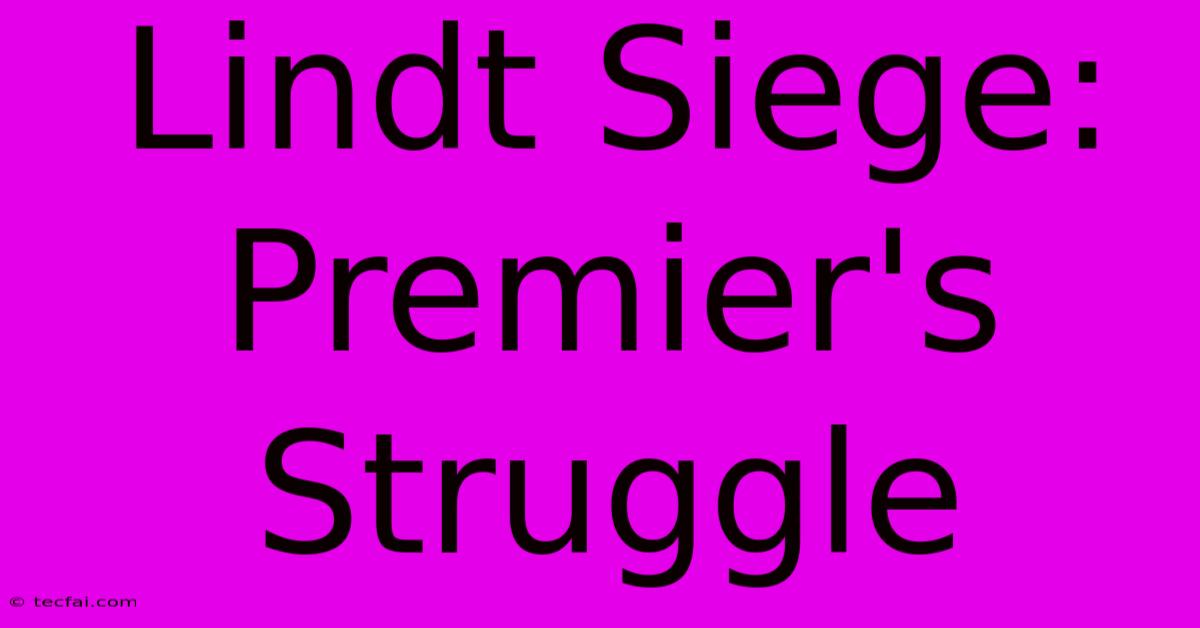Lindt Siege: Premier's Struggle

Discover more detailed and exciting information on our website. Click the link below to start your adventure: Visit Best Website tecfai.com. Don't miss out!
Table of Contents
Lindt Siege: Premier's Struggle with a City Under Siege
The Lindt Café siege in Sydney, Australia, in December 2014, remains a stark reminder of the fragility of security and the immense pressure placed on leaders during times of crisis. Beyond the immediate tragedy and the heroic actions of the victims and emergency services, the siege exposed the immense struggle faced by then-Premier Mike Baird, a relatively new leader thrust into the heart of a national and international emergency. This article explores the multifaceted challenges Baird faced during the Lindt siege, analyzing his leadership and the lasting impact on his premiership.
Navigating the Information Void: A Balancing Act of Transparency and Security
One of Baird's most significant challenges was managing the flow of information during the siege. The unfolding events were chaotic, with conflicting reports and a desperate need to balance public transparency with the critical need to protect the lives of the hostages. Providing too much information risked compromising the police operation, potentially endangering the hostages further. However, withholding information fuelled public anxiety and speculation, leading to misinformation and potentially eroding public trust.
Baird had to carefully navigate this tightrope, relying on regular briefings from the NSW Police Force and other emergency services. He was tasked with addressing the media frequently, offering updates that were both informative and reassuring, whilst carefully avoiding revealing details that could jeopardize the ongoing operation. This demanded a delicate balance of empathy, authority, and measured communication under immense pressure.
The Weight of Public Expectation and Media Scrutiny
The 24/7 news cycle amplified the pressure on Baird. The siege unfolded on live television, subjecting his every word and action to intense scrutiny from the media and the public. Every decision, every pause, every expression became fodder for analysis and criticism. The nation watched, and the world watched, placing an incredible weight of expectation on his shoulders. Any perceived misstep or perceived lack of decisive action would be magnified and amplified, impacting both public confidence and his political standing.
Maintaining a calm and reassuring demeanor in the face of such intense pressure was vital. Baird had to convey empathy for the victims and their families, while simultaneously assuring the public that the authorities were doing everything in their power to resolve the situation safely. This was a significant feat of emotional regulation and leadership under extreme duress.
The Aftermath: Political Fallout and Lasting Impact
Even after the tragic resolution of the siege, Baird's leadership continued to be debated and analyzed. The intense scrutiny didn't cease; questions were raised about communication protocols, police strategies, and the adequacy of counter-terrorism measures. While generally praised for his calm and measured response, some criticisms persisted regarding the handling of information and the perceived lack of swift action.
The Lindt siege profoundly impacted Baird's premiership. The event marked a defining moment, shaping his public image and influencing policy decisions in the years that followed. The experience underscored the importance of robust crisis management procedures, enhanced counter-terrorism strategies, and the crucial role of open but carefully managed communication during a national emergency.
Lessons Learned: Resilience and Leadership in Crisis
The Lindt siege serves as a case study in crisis management and leadership. Baird’s experience highlights the immense challenges faced by leaders during such events. It emphasizes the importance of:
- Effective communication: Balancing transparency with security is paramount.
- Emotional intelligence: Maintaining composure and empathy in the face of intense pressure is critical.
- Collaboration: Effective crisis management requires seamless collaboration among various agencies and levels of government.
- Post-incident review: Thorough analysis is essential to identify areas for improvement and prevent future tragedies.
The Lindt siege remains a complex and deeply emotional event. While there were many heroes that day, the experiences and actions of Premier Mike Baird represent a significant aspect of this challenging chapter in Australian history, providing valuable insights into leadership during times of national crisis. The siege continues to be a source of learning and reflection, shaping crisis management protocols and approaches to leadership in the years since.

Thank you for visiting our website wich cover about Lindt Siege: Premier's Struggle. We hope the information provided has been useful to you. Feel free to contact us if you have any questions or need further assistance. See you next time and dont miss to bookmark.
Featured Posts
-
Michigan Upsets Ohio State 13 10
Dec 01, 2024
-
1967 Chevy Ii Nova Paul Walkers Car
Dec 01, 2024
-
Perth Wildcats Record Breaking Points
Dec 01, 2024
-
Matildas Goal Missed Call Angers Brazil
Dec 01, 2024
-
Small Business Saturday Why It Matters
Dec 01, 2024
